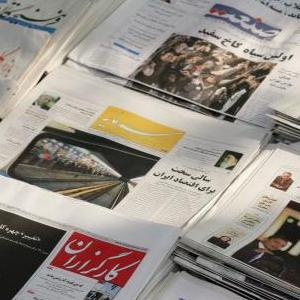Tehran's Daily Newspaper Review

In his meeting with students on Wednesday, 10th of August, Ayatollah Khamenei praised the Islamic Revolution for adhering to its original causes after over thirty years; namely, calling for Islam, challenging imperialism, preserving the country’s independence, bringing dignity to humankind, defending the underprivileged, and the all-comprehensive progress of Iran.
“The Revolution has not deviated from its values”, Iran printed. In his meeting with university students the Supreme Leader also stated, “today’s youth are as zealous as the youth of the Revolution era, but with stronger rationality, and this is highly valuable.” Interestingly, Iran also quoted Ayatollah Khamenei as saying that “work done as to Article 44 [privatization of state-run economic agencies] is acceptable overall, but not complete and satisfying.” Iran also cited the Head of the Election Bureau Seyyed Sowlat Mortazavi, who claimed, “those doubting the accuracy of elections intend to marginalize the Guardian Council.” The newspaper’s editorial, a brief moralistic essay, called for accountability in the workplace, healing broken hearts, and avoiding baseless slanders.
Jomhouri-ye Eslami covered “The most serious violence in Manchester in 30 years”, along with Ahmadinejad's criticism of the UN Security Council for remaining silent about the course of events in Britain. “The trend to tarnish the image of [prominent political] figures should not continue,” the newspaper quoted Sadegh Larijani. In its editorial, Jomhouri-ye Eslami reviewed weekly events, including the riots in London which “have basically social and political roots.” They are, according to the author, old wounds of social hatred inflicted due to the racism that dominates British society and its government.
Kayhan’s banner headline was a quote extracted from Ayatollah Khamenei’s speech: “Iran's non-deviation from the Revolution’s values is an exception in the global history of recent centuries.” In Britain the British youth will continue their battle until the realization of justice, Kayhan reported. “Popular protests or armed terrorists’ wanderings?” Kayhan asked, covering the developments in Syria. Kayhan also criticized the kings of Saudi Arabia and Bahrain for calling Bashar Assad –“the most popular leader of the Arab World” according to Kayhan- to stop killing citizens.
Resalat covered Ahmadinejad's demand that “Britain stop its brutal crackdown of people.” It also quoted conservative Ali-Akbar Velayati, former minister of foreign affairs, that the “7+8” mechanism-- the Principlist delegation in charge of drafting a single slate for the parliamentary elections-- is acceptable to the majority of Principlists. The daily also quoted from Minister of Intelligence Heydar Moslehi’s interview with Mehr news agency in which he stated that Iran has foiled the US’ efforts to incite new unrest in Iran via social networks. Resalat’s editorial, inspired by Ayatollah Khamenei’s recent remarks, elaborated on “clan-ism” in Iranian politics. According to the author, Mahmoud Farshidi, minister of education in Ahmadinejad's first cabinet, Hashemi Rafsanjani’s administration witnessed the height of clan-ism, while the trend still continues, even inside Ahmadinejad's administration.
Shargh reported of up-and-coming Hamid Baqa’ee replacing Esfandiar Rahim Mashaei inside the government, as the latter has shunned the media following increasing criticism of him after Ahmadinejad's disobedience of the Supreme Leader’s request that he keep Heydar Moslehi in the cabinet. It also quoted Majles’ Foreign Affairs Committee Chairman Alaeddin Boroujerdi, who in his visit to Egypt had called for supporting Syria and not allowing the country to fall prey to Washington. Shargh’s editorial, written by former deputy higher education minister in Khatami's administration Mohammad-Reza Zarifian, criticized the implementation of a gender quota system in this year’s national universities admissions.
Velayati’s defense of the 7+9 mechanism, Ayatollah Khamenei’s remarks, and riots in Britain were front page headlines in Tehran-e Emrooz. “The Echo of Cromwell’s footsteps”, Tehran-e Emrooz’ editorial, analyzed the nature of protests in British cities.
Trouble with understanding some terms? Check our Glossary of Iranian Political Terms.
Briefing
Hamshahri (Citizen) is the official daily newspaper of Tehran's Municipality. Its general directions in politics, culture and economy are determined by the mayor of Tehran, currently Mohammad Baqer Qalibaf.
Iran is the official organ of the administration.
Jomhouri-ye Eslami (The Islamic Republic) was known as the official organ of the Party of the Islamic Republic, founded in 1979 and disbanded in 1987. Currently, it is an open critique of Mahmoud Ahmadinejad's policies and is known to be a mouthpiece of Akbar Hashemi Rafsanjani.
Kayhan (Universe) is a hard-line conservative newspaper. Its editor-in-chief –currently Hossein Shari’atmadari- is appointed by Iran's Supreme Leader. Shari’atmadari’s editorials often spark off controversy and debate inside Iranian political circles.
Khabar (News) is a principlist daily newspaper which adopts a critical stance towards Ahmadinejad's policies.
Resalat (Mission) belongs to the moderate wing of the principlist camp. Resalat’s best known analyst is Amir Mohebbian, its political editor.
Shargh (East) is a moderate reformist newspaper. It was the most popular and influential reformist newspaper in its first period of publication which lasted from August 2003 until September 2006.
Tehran-e Emrooz (Tehran Today) is a ‘principlist reformist’ newspaper, connected to Mohammad Baqer Qalibaf.
Vatan-e Emrooz (Motherland Today) -which started its publication in November 2008-, belongs to Mehrdad Bazrpash, the thirty-old pro-Ahmadinejad politician who is also head of Iran's second largest auto manufacturer company, Saipa. Vatan-e Emrooz is a supporter of the president’s policies.

